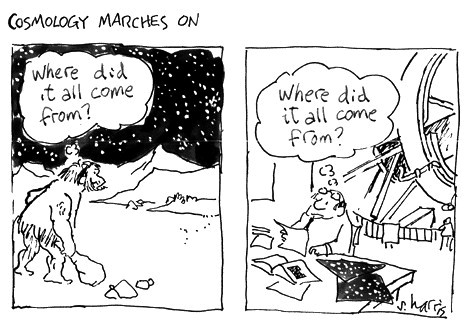Did we learn the concept of God and infer his existence from some other more basic belief, or did we have the concept of God or a belief in his existence ‘already in the mind’? Such is the issue of nativism: whether there is something in the mind prior to experience. Some theologians and philosophers espouse strongly nativist views. For example, Gordon Clark argues for a form of concept nativism. He argues that human beings have “innate ideas and a priori categories” the purpose of which are for “receiving a verbal revelation, of approaching God in prayer, and of conversing with other men about God and spiritual realities.” Clark makes two arguments for his view. First, he argues that it is not possible to arrive at a concept of God from sense experience:
“Since man was created in the image of God, he has an innate idea of God…it is not possible for a blank mind to abstract the concept of God from sensory experience nor to lift sensory language by its bootstraps to a spiritual level. The theories of empiricism, of Aristotle, of Aquinas, of Locke, are to be rejected.”
Clark does not mean to suggest that no experience is involved in obtaining a concept. Clark says, “To all appearances their minds are blank, but the blankness is similar to that of a paper with a message written in invisible ink. When the heat of experience is applied, the message becomes visible.” While the concept lies embedded in the mind, it takes some experience—in this case, the experience of language uttered or inscribed—to expose the concept to the conscious mind.
Second, Clark suggests that if an innate concept is to be exposed, experience alone is not sufficient to expose it. Instead, Clark suggests that God must act in illuminating the human mind. Whereas a naturalistic theory can suggest that experience acts as the stimulus condition for an innate disposition, a theistic theory can suggest that innate dispositions plus its stimulus condition are necessary but not sufficient conditions for knowledge acquisition. According to Clark, it is only when God acts on a person can that person acquire knowledge.
Clark goes on to argue that concept nativism provides the best explanation for human communication. Communication is possible “because all men have these same ideas.” If so, then there must be some explanation for how humans acquire the same concepts. The miracle of communication presupposes three features of the world and human conceptual schemes. The world must be rationally designed, human minds and the world must be so related as to make it possible for human conceptual schemes and the rational design of the world to fit with each other. Finally, the conceptual scheme must be species-wide. In order for communication between people to occur, we must have the same ideas as each other. For Clark, nativism provides the best explanation for the phenomena.
Clark’s view exemplifies a prominent evangelical position on the possibility of human knowledge, rationality and language. According to this view, human knowledge, rationality, and language would not be possible unless God exists. According to this view, God is a supremely rational being from whose mind human beings derive the capacity to reason. As Nash puts it:
“Reason has an intrinsic relationship to God. The law of non-contradiction is a law of being because the universe is the creation of a rational God. The rational world (the creation) is knowable because it is the projection of a rational God who objectifies His eternal thoughts in creation. The mind of God can be known by the human logos because God has created us as creatures capable of such knowledge.”
However, while a dependence on God for the capacities of the human mind follows from this view, it is not clear that innate concepts or beliefs must be part of the human intellectual apparatus. First, consider Clark’s second argument. Clark seems to suggest that since we require God to illumine our mind, what we discover in the mind must already be there. Perhaps the concept of God is in the mind and all God must do is shine a light on it so that we can ‘see’ it. But why think this must be the case? It could equally be the case that God illumines the mind in order to understand his self-revelation in creation. There is a distinction between revelation and illumination. Revelation is God’s disclosure of himself. Illumination is an act of God on the human mind making it possible for the person to understand what has been revealed (See Feinberg’s Light in a Dark Place for an argument to this effect). The light of revelation can only be seen by a person who has the sight to see it. Illumination is the light that removes the blindness. But this would be so if the revelation is inside the mind or in the world. It does not follow from the fact that God illuminates the mind that what he reveals to that mind is already in it.
Second, one needs an argument to the effect that it is not possible to abstract an idea of God from creation. Why think so? Clark does not tell us, but an argument could be constructed. For example, Peter Geach argued that abstractionism is entirely false: “no concept at all is acquired by the supposed process of abstraction.” His main contention is that concepts of unobserved items could not be generated merely by mental acts upon observable items. Redness cannot be abstracted from an instance of a red object just by focusing on a single aspect of the object. Geach asks us to consider what the necessary condition for focusing on the redness of an object might be. His answer is that we would already have to possess the concept in order to focus on it. But this would be to deny that it is possible to abstract the concept of red from the experience of something that possesses that property. One might suggest that we don’t gain concepts without instruction. Perhaps we learn the concept of red when a teacher or parent points at the object and says, ‘red’. In this case, we might gain the concept from both an experience of the object and some instruction by which we have the concept brought to us in a name of the color. Presumably, we would also gain other concepts simultaneously. We would require the concept color in order to gain the concept red. Thus, Geach concludes that we possess the concepts, but we cannot learn them, at least we cannot learn them by focusing on an aspect of an object.
If we cannot gain the concept of red from perceiving a red object, then we have little chance of gaining the concept of God from our observation of the world. Thus, Clark may have some support for his claim that concepts of God cannot be derived from experience. And if they are not derived from experience, then they must be innate.
There are two ways to avoid Clark’s conclusion. The first is to deny that experience is not sufficient for concept acquisition. This is the general strategy of an empiricist to which we will return in dealing with empirical theories. The second, however, falls into the nativist camp but avoids positing innate concepts or beliefs as the explanation for our possession of the concept of God. Instead, such theories suggest that there is an innate mechanism in the mind responsible for the production of such beliefs and concepts when exposed to the right environmental stimulus conditions. Thus, though there are no innate concepts or beliefs, there are mechanisms designed to produce them given the right stimulus conditions.
For example, Alvin Plantinga argues that we have “an innate tendency, nisus, or disposition to believe in [God].” Rather than an actual belief in God, Plantinga says that we have a “strong tendency or inclination toward belief in him.” On the dispositional account, what is inside the human mind is not the idea or belief itself, but rather a disposition for such an idea or belief to emerge given the presence of certain stimulus conditions: we have “a disposition or set of dispositions to form theistic beliefs in various circumstances, in response to the sorts of conditions or stimuli that trigger the working of this sense of divinity.” Plantinga suggests that the stimulus condition is an encounter with nature. Thus, when the universe is perceived by human beings they form a belief in God.
What does it mean for someone to have a disposition? Dispositions are usually parsed in terms of manifestations and stimulus conditions. The most common example in the literature is the disposition of glass to shatter when struck. A glass manifests its disposition by shattering when presented with its stimulus condition – being struck. On the dispositional view of theistic concepts and beliefs, the same is true – we manifest theistic beliefs when presented with certain stimulus conditions – an experience of nature. Of course, in the case of the stimulus, other senses—sight, hearing, touch etc.—are involved for it is via our ordinary faculties that the mechanism receives the data sufficient for the manifestation of its disposition.
What the dispositional account denies, therefore, is that human beings learn that God exists. To learn a concept or belief is to formulate and test a hypothesis about its content. To learn that God exists, therefore, is to rationally process data and reach a conclusion. In contrast, to acquire a belief or concept due to a disposition is a causal process whereby there is no testing of a hypothesis. Just as the glass shatters upon impact, the mechanism produces theistic beliefs upon its being triggered by the input from nature.
Christian nativists often appeal to Romans 1:18-21 in support of the view that human begins have an innate concept of God or an innate belief in the existence of God. Paul writes to explain what justifies God’s wrath on unbelievers. He tells his reader that human beings are liable for the sin of knowing God yet “suppressing the truth in unrighteousness.” Paul’s point is not about the source of the universal knowledge of God, but about its consequences. However, Paul does give some indication of the source when he tells his reader that their knowledge derives from “things that are made” (1:20). Some theologians argue that though creation is one source, an innate knowledge is another. They ground this belief in verse 19 in which Paul says that “that which is known about God is evident within them; for God made it evident to them” (1:19). But does this verse teach that God makes it evident within them by implanting an innate idea or does it teach merely the fact that everyone has such beliefs within them? The latter is more plausible since Paul goes on to explain how God has made it evident to them – by the things he has made (1:20).
John Feinberg considers the implications for a theory of knowledge acquisition. What he says sounds decidedly Lockean:
“Paul is saying that the invisible things of God are known in a, so to speak, two-step process. First, there is the sense perception of the visible world, and then second, the understanding realizes that what has been sensed must have a maker. Of course, since no mere human, no angelic being, and no inanimate force could make the created universe, someone (or something) far greater must be its maker. Only God as creator makes sense.”
For Feinberg, innate beliefs are not in view. What is clear from the text is that God makes himself known through creation and that human beings have the capacity for inferring that God exists from their experiences of creation.
In contrast, Greg Bahnsen writes, “This knowledge of God is mediated in the sense of being caused by the stimulus of the external world and man’s internal constitution, but it is apprehended immediately without argumentation, computation, or self-conscious reasoning.” For Bahnsen, a natural revelation of God is knowledge obtained without inference or argument. It is immediate even while it is “caused by the stimulus of the external world.” Natural theology, on the other hand, “consists of discursive arguments that begin with observations about the natural world…and that draw inferences about the supernatural existence or character of God.” For many reformed theologians who are opposed to natural theology, much rests on the process by which one obtains a belief in God’s existence. If there is an inferential process, no matter how brief or simple, then a belief in God is not a basic belief. This is because an inference implies something more basic. As Feinberg’s quote suggests, one begins with a perception of the world, then one realizes that such a thing requires an explanation. Finally, one concludes with the belief that God must have made the world. In contrast, Bahnsen argues that though the experience of the world is required to stimulate the mind to produce a belief in God, it is not a process of inference from one belief to another. The so-called reformed objection to natural theology rests on whether belief in God is obtained as a result of an inference. If it is, then natural theology is entirely legitimate. If not, then natural theology cannot be construed as reasoning to God from some more basic premise.
So, does the text support a nativist or empiricist view? Feinberg argues that the two verbs that Paul uses makes nativism unlikely. Paul says that God’s attributes have been “clearly seen” and are “understood.” Feinberg takes Paul to mean that first creation is perceived through the senses and only then understood by the person. On Feinberg’s view, the latter term refers to a process of inferring from what one senses to the existence of God and then to God’s attributes: “no one needs advanced degrees (or even far less education) to make the logical connection from what is made to a maker. Anyone with normal intelligence can make this rational maneuver.” Feinberg clearly thinks that a belief in the existence of God is the conclusion of a logical inference. Thus, our belief in God is not basic. It is also the consequence of an ordinary human mind. Although he does not say it explicitly, Feinberg most probably does not consider the process to be carried out by a device in the mind whose sole task is to produce beliefs about God. Feinberg thinks that it is a rational inference from the experience of the world to God whose existence explains the existence of the world. This is the reasoning of inference to the best explanation not the disposition to produce a belief in God upon being in the environment of the world.
On examining Romans 1:20, it is not clear which view is more likely. The trouble is that there is no way to tell whether understanding means ‘inferring from’ or if it means ‘producing when correctly stimulated’. Both are possible. Is it even possible that Paul thinks we have innate concepts and beliefs? Again, there is not much evidence to go on either way. John Cook argues that Paul is borrowing from the philosophical lingua franca of his day. He goes on to show that interpretations of Paul’s phrase reflect a presupposition on behalf of the interpreter, either as innate ideas in the soul or as inferences from experiences of the world. Thus, if Paul is borrowing his terms from his philosophical counterparts, he is not clearly identifying with any camp.
The trouble is: we have no theological means by which we might discern the correct view. Do we gain knowledge of God from an inference to his existence from our experience of nature, or an immediate a priori intuition, or from the workings of an internal mechanism that produces theistic beliefs? Each view assumes something about the nature of the mind, the source of our knowledge, and the means by which God communicates his existence to human beings. However, I think Feinberg’s argument to rule out an innate concept or belief is convincing enough. It does seem that an innate belief is not what Paul is talking about. It is more plausible that he believes that God uses the world to reveal himself to human beings and in doing so humans form theistic beliefs (as opposed to recollecting them). However, this is entirely compatible with the view that the human mind contains an innate mechanismthat produces theistic beliefs. Thus, though Romans 1:20 might make us skeptical of innate beliefs and concepts, it is perfectly compatible with the existence of a domain-specific mechanism. And if that counts as nativist, then nativism is a genuine option.
John Feinberg, Light in a Dark Place: The Doctrine of Scripture (Wheaton: Crossway, 2018), 51.
Greg Bahnsen, Van Til’s Apologetic: Readings and Analysis (Phillipsburg, NJ: Presbyterian and Reformed, 1998), 184.
John Grainger Cook, “The Logic and Language of Romans 1:20,” Biblica 74 (1994): 501.
Alvin Plantinga, Warranted Christian Belief (New York: Oxford University Press, 2000), 173.
Alvin Plantinga, “Reason and belief in God,” in Faith and Rationality (Notre Dame: University of Notre Dame Press, 1983), 16–93.
Paul Helm, “John Calvin, the sensus divinitatis, and the noetic effects of sin,” International Journal for Philosophy of Religion 43 (1998): 92.
Fiona Cowie, What’s Within? Nativism Reconsidered (New York: Oxford University Press, 1999), 81.
Gordon Clark, Religion, Reason and Revelation (Philadelphia: Presbyterian and Reformed, 1961), 135. For a similar view, see Ronald Nash, The Word of God and the Mind of Man: The Crisis of Revealed Truth in Contemporary Theology (Phillipsburg, NJ: Presbyterian and Reformed, 1982).
Peter Geach, Mental Acts (London: Routledge and Kegan Paul, 1967), 18.





